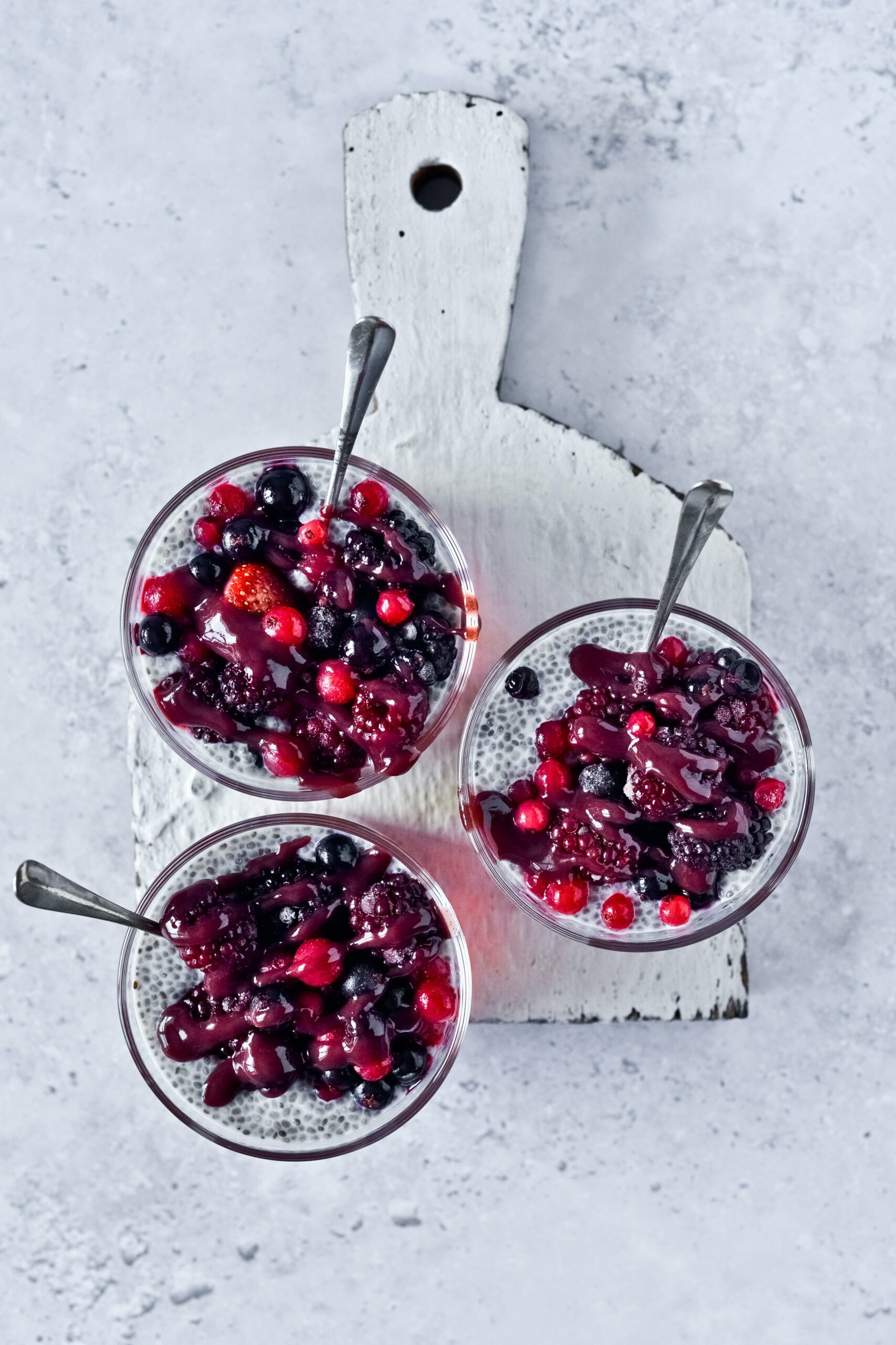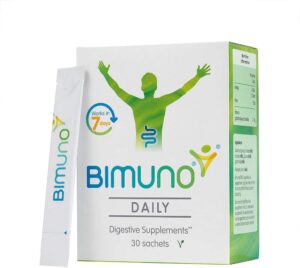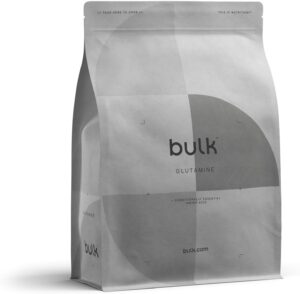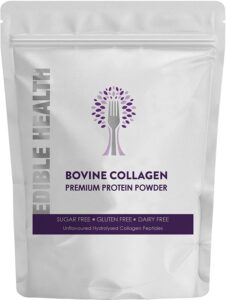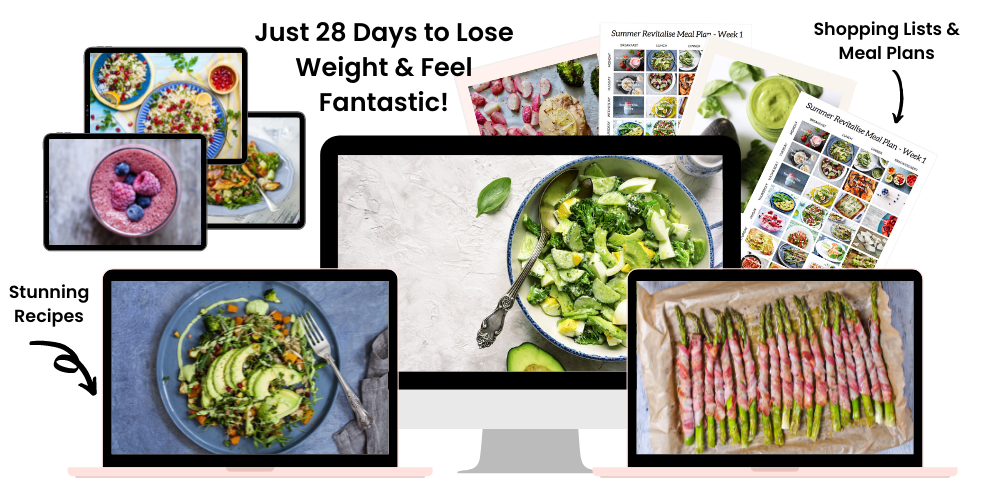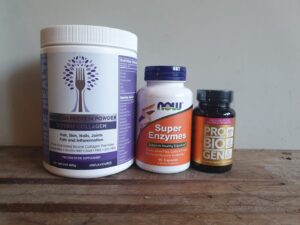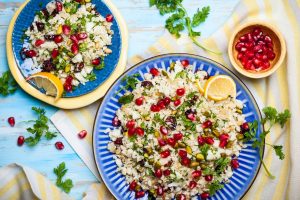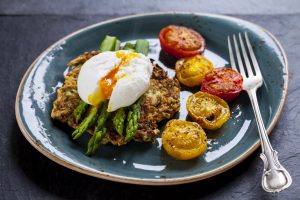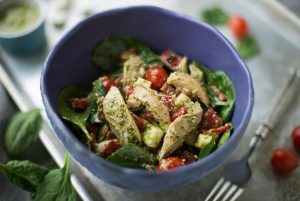Whilst I am not sure if there is any research which supports eating chia seeds to improve gut health, they are a high fibre and low-FODMAP food and for that reason I believe they are likely to be good for your gut.
Turning them into chia pudding to which you can add other gut supporting foods makes a great low-sugar, high-fibre dessert option that can help you feel full and satisfied and prevent snacking on unhealthy foods in the evenings.
Chia pudding is very easy to change up to suit the seasons too. You could add raspberries or strawberries in summer, pears in autumn and warm apples with cinnamon in winter. Stewed prunes are also really nice with chia and are an additional great source of fibre.
My basic recipe for Chia Pudding is 3 tbsp. chia seeds mixed with 250ml of dairy-free milk. I usually use Grace coconut milk.
I sometimes sweeten it with 1 tbsp. maple syrup, but if using sweeter fruit as a topping you may not need any maple syrup.
It’s also really delicious with added lemon or orange zest.
Chia Pudding
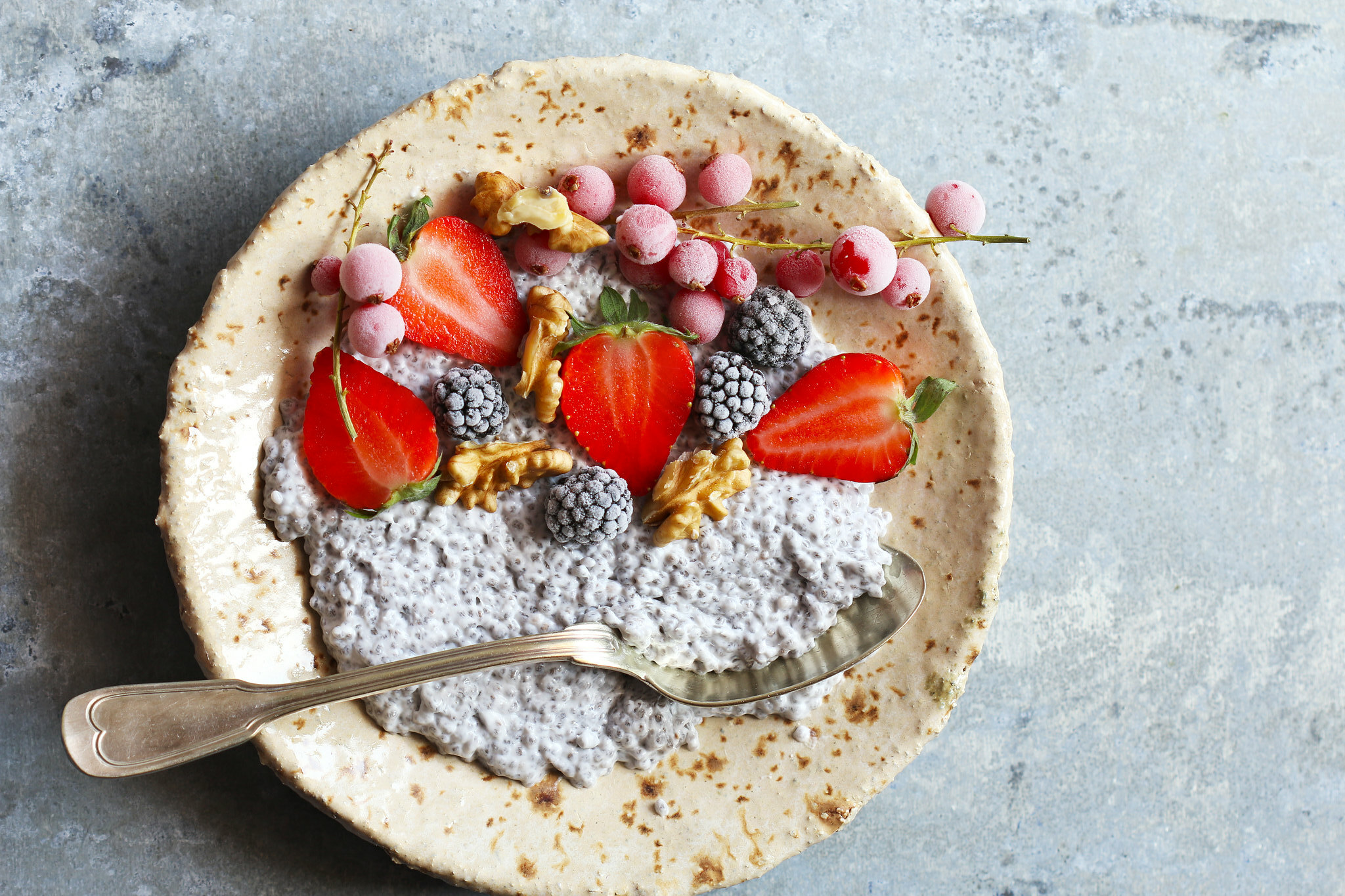
Serves 1
Ingredients:
- 250ml dairy-free milk, unsweetened
- 1 tbsp maple syrup
- 1 tsp. pure vanilla extract
- 3 tbsp. chia seeds
- Nuts, berries, fruit, coconut flakes for topping (optional)
Method:
- In any glass container, add milk, maple syrup, vanilla and chia seeds in this particular order.
- Stir well with a spoon or fork, let sit for 1 minute and stir again. This will prevent lumps. Then refrigerate overnight.
- When ready to eat stir and top with your favourite toppings: nuts, berries, fruit, coconut flakes etc.
Gut Supporting Additions
PREBIOTICS
An important step towards good gut health is ensuring that you feed the beneficial bacteria with prebiotics. Prebiotics are special fibres found in complex plants and roots that feed beneficial strains of bacteria, helping them to grow and crowd out pathogenic bacteria.
There are a couple of different options I would recommend for prebiotics.
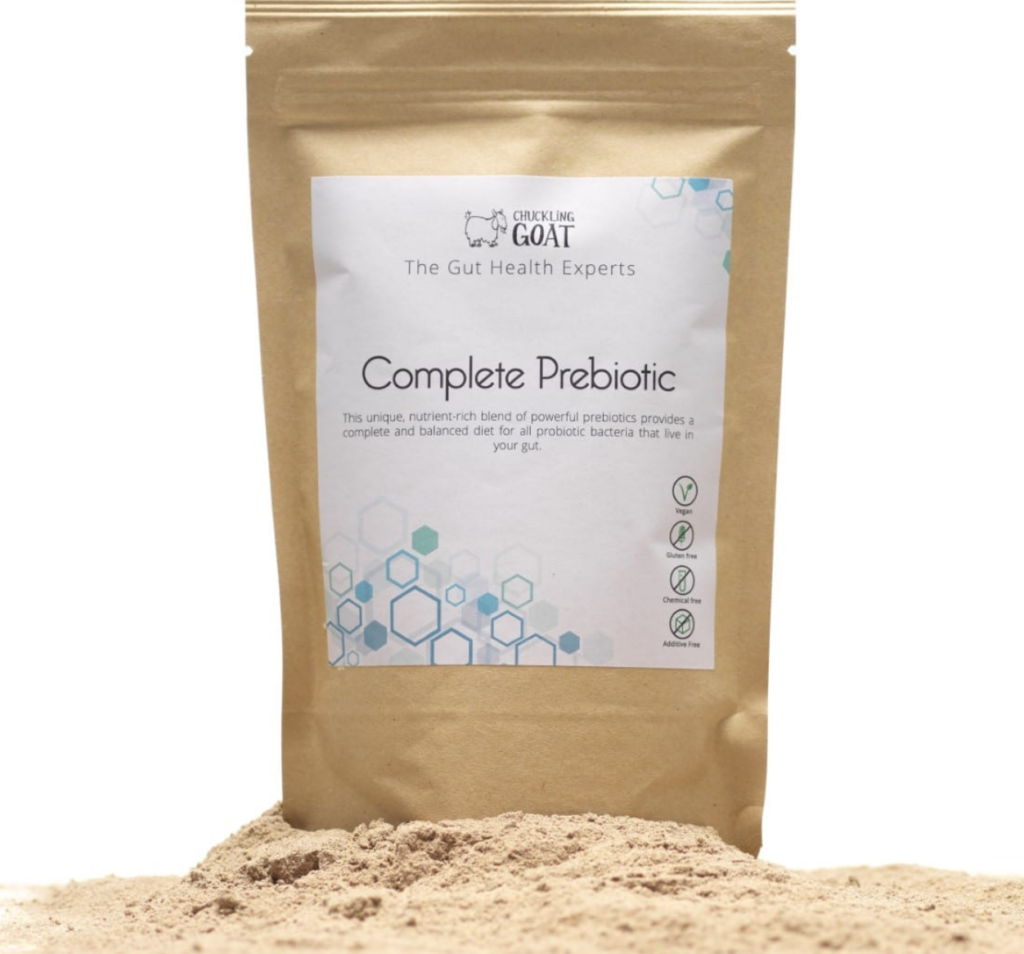
Chuckling Goat Complete Prebiotic – designed in collaboration with the microbiome scientists at Atlas Biomed, the COMPLETE PREBIOTIC contains more different requisite strains of gut-friendly fibre than any other prebiotic on the market. The daily dose of 2 teaspoons provides 30% of your recommended daily fibre intake. This all-natural product contains every naturally available source of all the fibres your gut bugs need.
Inspiriko Love Thy Gut Organic Prebiotic Fibre which contains baobab, flaxseed, maca, inulin, acai berry, goji berry, blueberry and aronia berry.
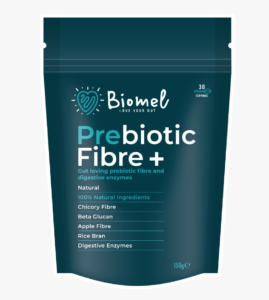
Biomel Prebiotic Fibre+ contains a blend of prebiotic fibres, digestive enzymes and vitamins and minerals. They also have a low-FODMAP fibre which would be an excellent choice for anyone following the low-FODMAP diet or who finds prebiotic fibre too ‘strong’ for them.
I also like Bimuno® prebiotic. I recommend Bimuno® as a quality prebiotic supplement that is well tolerated by most people. Bimuno® is backed by a substantial programme of scientific research conducted in collaboration with the University of reading, UK. It is clinically proven to provide a wide range of health benefits.
Bimuno® works by selectively increasing the level of bifidobacteria and other health-promoting bacteria found in the gut microbiome. Bimuno® has multiple activities including:
A proven prebiotic function that increases gut bifidobacteria in just 7 days to aid microbial balance in the gut and thereby improves colonization resistance.
An anti-invasive function that protects the small intestine against bacterial pathogens such as Salmonella.
Interactions with the immune system that enhances the gut barrier function and triggers positive systemic effects throughout the human body.
Bimuno® is not suitable if you are intolerant to dairy. Bimuno® Daily powder is not suitable for vegans as it contains lactose and residual amounts of milk protein (Whey and Casein).
You can purchase Bimuno® on Amazon.
START SLOWLY!
You need to start slowly with prebiotics. This is fibre, and if you are not used to consuming much fibre you could experience digestive distress (gas, bloating, upset stomach etc.) if you start adding too much too quickly!
I would recommend starting with half a teaspoon of the prebiotic fibre, and increasing by half a teaspoon every few days until you are adding the recommended dose on the packet.
L-GLUTAMINE POWDER
As well as the important food and supplements we are already including (bone broth, stewed apples, probiotics) there are several nutrients that support gut healing/help to heal intestinal permeability (leaky gut).
These include:
- L-glutamine
- N-Acetyl Glucosamine
- Aloe Vera (discussed for IBS in week 1)
- Slippery elm bark
- Marshmallow
- Deglycyrrhizinated licorice (DGL)
- Quercetin
- MSM
There are many formulations on the market that contain a combination of these ingredients. If you feel you need more help to heal your gut, or you are struggling with consuming the bone broth, then one of these formulations could be an option for you. My advice would be to first try L-glutamine on it’s own.
A 2011 review paper concluded:
“There is ample evidence to indicate that L-glutamine is the essential dietary supplement to help maintain mucosal integrity and barrier function”
And a 2017 paper concluded:
“Experimental studies showed that glutamine is able to
modulate intestinal permeability and tight junction protein expression in several conditions. Recent articles underlined its putative beneficial role in gastrointestinal disorders such as irritable bowel syndrome.”
L-glutamine or a leaky gut/gut healing formulation would be another short-term intervention that can help in anyone who is not responding well to dietary changes. You can buy L-glutamine on Amazon. I add a 5g scoop of L-glutamine to either my gut-health smoothie or to chia pudding.
COLLAGEN / GELATIN
Collagen is an easily digested form of protein that improves skin, hair and nails.
Starting at about age 35, collagen production naturally begins to slow, which can have all sorts of negative effects on your body. By age 40, collagen begins to deplete faster than your body can reproduce it, and by age 60, over ½ of your body’s collagen has been depleted.
Collagen can improve gut integrity and digestive strength by enhancing gastric acid secretion and restoring a healthy mucosal lining in the stomach. It is flavourless and dissolves easily.
You can take bovine collagen which is usually cheaper, or marine collagen which is more expensive. Marine collagen is purportedly the best absorbed form of collagen.
Until tomorrow,
Chloe x
About Me
Hello, I’m Chloe. I’m a nutrition and health coach and I’m on a mission to inspire & support women so they can go from feeling fatigued to feeling fabulous!

I help women who are FED up of being overweight, addicted to sugar and feeling tired ALL THE TIME to lose weight and optimise their health by fixing hormonal, digestive, autoimmune and energy issues.
My step-by-step programme, Revitalise, will help you lose weight, get back your energy, restore vitality and create lifelong health using the power of beautiful & delicious REAL FOOD.
I’m here to make it easy for you to eat healthy, delicious food without counting calories or feeling deprived. You’ll reset your relationship with food, shift your mindset and build new habits for a complete health transformation!
Disclaimer: All information provided is for informational purposes only, and is not to be construed as medical advice or instruction. Please consult your GP or a qualified health professional on any matters regarding your health and wellbeing. I am a nutritional educator and do not dispense medical advice nor prescribe treatment. While nutritional support can be an important complement to your medical care, a nutritional therapy program is not a substitute for the diagnosis, treatment, or care of a disease, illness, or injury by a medical provider. Nutritional evaluations and lifestyle assessments are not intended for the diagnoses of disease.
Disclaimer: chloearchard.com is a participant in the Amazon EU Associates Programme, an affiliate advertising programme designed to provide a means for sites to earn advertising fees by advertising and linking to Amazon.co.uk. Buying through our affiliate links does not cost you anything but helps us keep this website up and running. Thank you!
All information provided within this blog post is for informational purposes only, and is not to be construed as medical advice or instruction. Please consult your GP or a qualified health professional on any matters regarding your health and wellbeing or on any opinions expressed within this blog post. The information provided in this blog post is believed to be accurate based on the best judgment of the author. However, you as the reader must be responsible for consulting with your own GP or other health professional on matters raised within. chloearchard.com will not accept responsibility for the actions or consequential results of any action taken by any reader.
The material in this blog post may include information, products or services by third parties. Third Party Materials comprise of the products and opinions expressed by their owners. As such, chloearchard.com does not assume responsibility or liability for any Third Party material or opinions. The publication of such Third Party Materials does not constitute our guarantee of any information, instruction, opinion, products or services contained within the Third Party Material. Publication of such Third Party Material is simply a recommendation and an expression of our own opinion of that material.
